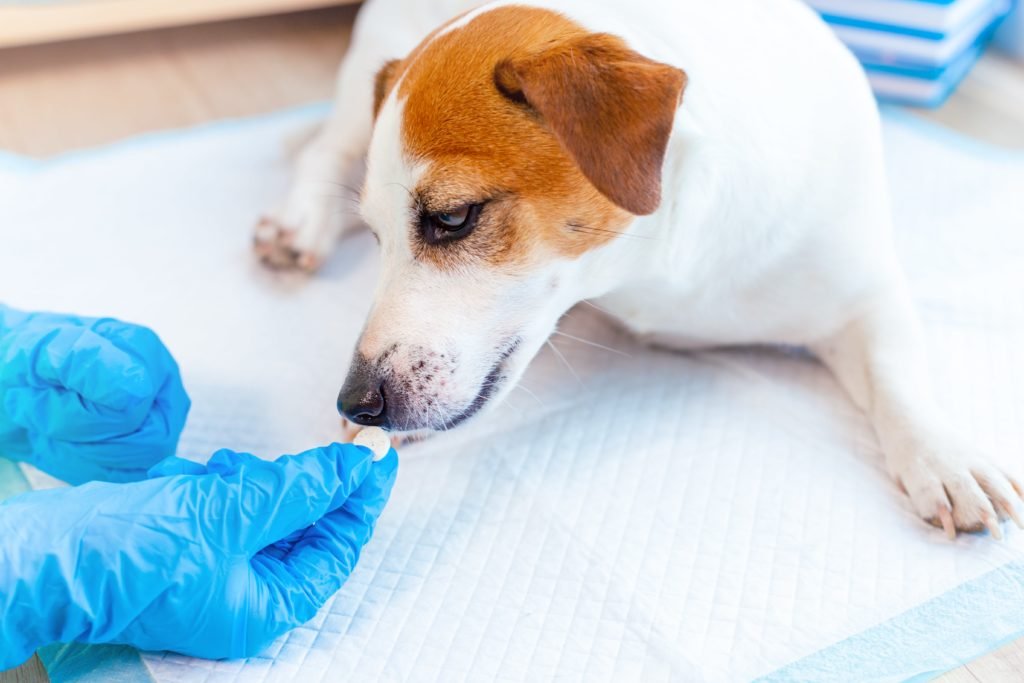Is your little furry friend urinating more than usual?
Are you witnessing him/her frequently running outside to empty the bladder?
Is your dog whining or crying while peeing?
Does it look like from his/her facial expressions that he/she is feeling immense pain while urinating?
Do you notice blood in your dog’s Urine?
Well, if either of the above is relatable, get attentive. Your dog might be having UTI, i.e., Urinary Tract Infection.
Urinary Tract Infection is an excruciating and potentially dangerous condition in dogs.UTIs are painful and uncomfortable at best and dangerous at worst. You need not worry; though it is serious, it can be cured. Just have a little patience.
If your dog is not showing any of the things listed above, you need to be attentive. If, in case very, unfortunately, you face the symptoms in your dog in the future, you will know how to deal with it. All dog parents must read it.
What is Urinary Tract Infection?

Urinary Tract Infection is pretty common in small animals. Almost 30% of dogs end up having UTI at least once in their lifetimes. It is an infection caused mostly by bacterias or pathogens, e.g., E.Coli, and sometimes by viruses and fungi in the urinary tract of dogs.
Mostly the bacterial UTI results from bacterias ascending the external genitalia and urethra. In rare cases, these bacterias travel through the bloodstream and spread the infection through the whole urinary tract resulting in UTI.
UTIs can develop in the bladder, the Kidney, or the prostate. To detect the exact location of the UTI, the Vet does a wholesome laboratory test along with imaging and examination.
Mostly, these infections can be cured with an appropriate diagnosis and medication. Once cured, they do not cause any permanent damage. Sometimes, symptoms of UTI can also indicate some other health condition such as tumor or cancer. If you remain a little diligent and observant, you can save your dog from bearing this pain ever.
But first, you need to know the symptoms that can be indicative of UTI.
Symptoms
You really need to observe your pet to catch any of the symptoms listed below.
- Frequent Urination by your dog- Your dog will need to go to frequent Urination; it will always run to go outside. By frequent Urination, we mean more than usual times he/she urinates. It will be more than usual, so you will end up noticing.
- Dripping Urine- Your Dog might not pee properly, and there might be only a few drops of Urine even when they will feel like peeing so much. They won’t be able to because of the pain, so they will deal with a constant feeling of urinating and a full bladder but not empty their bladder.
- Loss of bladder control- UTIs make it hard for the dogs to control their bladder, and they might end up urinating at any place. They won’t be able to hold on, and it won’t be their fault if they end up peeing inside the house, at the unusual places where they never peed before.
- Strong smell in your dog’s Urine- In this case, you will encounter a strong foul smell in your dog’s Urine which is not the case usually. The Urine will smell beyond toleration. Don’t worry. You need not deliberately go and smell the Urine; the smell would be so high that you would end up realizing it without trying.

- Presence of blood in the Urine- You can encounter a few blood drops in the Urine of your dog. This is rare but not unusual. Sometimes RBCs come up in the Urine and hence the blood.
- Dogs feel immense pain while urinating- In the case of UTI, dogs feel immense pain. The pain is sometimes so extreme that you can see it on their faces. They even whine and cry while urinating as it causes extreme pain to empty the bladder up.
- Cloudy Urine- The Urine of your dog will not be clear but cloudy. It will have a turbid appearance. It would be different from the usual.
- Fever- Your dog can encounter a high body temperature in extreme cases. They might catch fever because of the excruciating pain they deal with. It gives rise to their body temperature, and they catch the fever.
- Licking around the urinary opening- Dogs might lick around the urinary opening to find some relief from the pain. It is an indication that you take it seriously as they might be dealing with UTI.
- Increased thirst- Dogs encounter a sore throat and a zeal to drink water frequently. They will always be thirsty. They will drink more water than usual and will still be thirsty. Their water intake will increase to a noticeable level along with other symptoms.
- Lack of energy/ Lethargy- Your dog will not feel like playing and going outside. They will have very little energy than usual and will show lethargic symptoms. This is obvious because of the pain and discomfort. They won’t be active.
- Vomiting- In some cases of UTI, dogs even vomit as their digestion is not perfectly fine. Vomiting is sometimes even because of the pain and bacteria.
- Loss of appetite- Dogs might not feel hungry and eat less food than usual. They encounter loss of appetite in UTI. The pain diverts their attention from food, and they no longer feel hungry.
While any of the symptoms above are not a sure sign of UTI, at least one of them is present in UTI. Observe your dog for a few days for any of the symptoms mentioned above or anything unusual.
If you catch any of the symptoms above, read on, it might help a little.
Diagnosis

If you catch any of the symptoms mentioned above, you need to take your dog to the Vet.
The Vet will first perform a Urinalysis. Urinalysis is basically an analysis of the Urine. It detects all the components present in the Urine, and the Vet can then analyze if anything unusual is present in the Urine. It will detect the presence of bacterias, viruses in the Urine. Urinalysis reveals almost everything to confirm the presence of UTI.
Urinalysis is a test that detects the following things:
The Urine specific gravity shows how well the dog can concentrate its Urine. Urine-specific gravity compares the density of Urine to the density of water. It shows the health of kidneys.
It determines the capacity of the dog’s kidneys in diluting the Urine. If the Urine is too concentrated, it suggests that the kidneys are not in good health or there is a lack of fluids in the dog’s body.
- Bilirubin- It shows the breakdown product of blood. The purpose is to detect any bilirubin present in the Urine. Bilirubin is present in the liver. Bilirubin plays a very important role in digesting food. If the liver is functioning perfectly fine, it eliminates all of the bilirubin from the body.
But in some unfortunate cases, bilirubin is leaked into the Urine—its presence in the urine signals towards an unhealthy liver.
- Glucose- It shows the presence of sugar in the Urine. It also helps in detecting diabetes in dogs. The presence of a high amount of glucose in the Urine confirms the presence of diabetes, which itself provides a fertile ground for a lot of diseases.
- Ketones- The purpose is to measure the level of ketones in the Urine. Usually, for energy, the body burns glucose. But in case there is not enough glucose in the body to burn, it burns fat instead.
The burning of fat by the body for energy produces ketones. Ketones can be present in both Urine and blood both. If the ketone levels are too high in the Urine, it indicates diabetic ketoacidosis.
This is a complicated type of diabetes that leads to paralysis and sometimes even death. Detecting ketone levels helps in taking early action for your dog’s health before any kind of emergency.

- pH- pH levels at certain points indicate the level of infection. The pH of the Urine is tested to detect the acidity or basicity of the Urine. There is a particular range of Urine’s pH, which is considered healthy.
Too low pH signifies that the Urine is too acidic, and too high pH signifies that the Urine is too basic. In both too high and too low situations, there is a high possibility of developing bladder stones, which might give rise to urinary tract infections.
- Blood- In urinalysis, they try to detect all different kinds of cells that are present in the Urine. The blood cells, if present in the Urine, are detected by the same means.
- Protein- The presence of protein in blood is also detected in urinalysis. The presence of protein in the Urine signifies that the dog’s kidneys are damaged. When kidneys do not do their job of filtering Urine properly, some of the protein is leaked, and its presence can be detected with urinalysis. If protein is present in the Urine, it shows damaged kidneys.
Once the Vet has the results of urinalysis, they place the collected urine sample into a centrifuge to allow debris and cells to settle down at the bottom of the tube. These cells and debris are then evaluated by a vet under magnification. This examination reveals the presence of RBCs, WBCs, bacterias, etc.
This test can help in going further with the diagnosis. UTI is usually caused by Escherichia coli bacteria, commonly called E.coli. But, in a few cases, some other bacterias can be involved. Urinalysis reveals the type of bacteria involved. Once the Vet knows the bacteria, it will be easy for him/her to diagnose the infection properly. It will help suggest the appropriate antibiotics, supplements, and medications to treat the infection.
Usually, the vets immediately prescribe the most commonly used antibiotics to help in immediate relief. They even prescribe some painkillers to relieve dogs’ pain, as UTIs are painful. A diet change may also be recommended for fast recovery.
The vets recommend an appropriate course of medication to cure UTI. To ensure that your dog is cured, another urinalysis will be performed once the course of medication is completed and your dog is free of the symptoms you observed initially. Antibiotics mostly cure UTI, but if it persists, further tests and diagnosis will be required to deal with the disease. It might also indicate that the primary problem with your dog is his/her underlying health conditions rather than UTI.
Also See: 10 Movie Star Dogs – Barking some theatrics
Recurrent UTI

Recurrent UTI is when the dog experiences the infection more than thrice that too in just 12 months. This requires a deeper diagnosis than the normal ones to detect if it was a reinfection every time or a relapsing one.
Reinfection is an infection caused by a different organism than the previous one. It is altogether a new one, not one your dog dealt with previously. It occurs within 6 months of discontinuation of the antibiotics and treatment.
Relapsed infection is the one that is caused by the same organism again. The same bacteria or virus develop again and give rise to the UTI just the way your dog dealt with the last time. It also develops within 6 months of antibiotic discontinuation.
The situation of reinfection and relapse infection proves that some underlying condition in the body provides a fertile ground for the bacteria to redevelop again and again. The Vet performs a few deep tests to understand and detect the underlying health conditions. Post that, the Vet makes an effort to cure that particular disease first. It is very important to cure that underlying condition to prevent future infections.
If the infection is relapsed, there is a possibility that the diagnosis was not proper in the previous treatment. There was an inappropriate drug dose given which was less to cure the infection, or poor compliance with the medication was observed.
Sometimes, after a little relief, we become careless and may skip the medications altogether, providing a fertile ground for the infection to find its roots again.
In rare cases, It might be the fault of drugs too. Some drugs may show high efficacy in vitro during trials but low efficacy in vivo practically, which doesn’t treat the infection in the first instance properly and provides ground for its relapse.
In case your dog has underlying health conditions, the treatment of the conditions will be a prerequisite. The Vet will subsequently treat the underlying health conditions to prevent the infection from relapsing again. Overall good health of your dog will decrease the possibility of UTIs or any sort of infections in the future.
Also See: How To Help a Dog With Anxiety Issues
How to prevent UTIs?
It is not always your fault if your dog suffers from UTI. Many times, it is fate too. But to make sure things are okay on your end, you need to know a few things. Make sure to take care of a few things to avoid the disease altogether.
Usually, older female dogs are more prone to UTI. Also, if your dog suffers from diabetes, there are more chances he/she will catch UTI in the future. Work upon curing diabetes first.
Dogs who suffer from bladder stones are also more prone to develop the disease. Please ensure that you contact a vet to go through the process to remove bladder stones to avoid further bladder complications. The healthier the bladder Less will be the chances of developing UTI.
It is advisable to talk to your Vet and ask them a few things you need to take care of. They sometimes prescribe some medications and supplements to maintain the pH of the Urine and improve bladder health overall. Vets can recommend strategies that have proven to be effective with other dogs.

In general, You can take care of a few things to avoid the infection in the future:
- Prostate disease.
- Presence of stones in Kidney.
- Presence of stones in the bladder.
- Cancer of the bladder.
- Tumors in the bladder.
- Stress.
- Spinal cord health and abnormalities.
- Incontinence and congenital problems.
- Bladder health.
- Bladder inflammation.
- Fungal infection.
- Crystals.
- Viral infection.
Is there anything you can do to avoid this disease ever in the future in your dog?
Well, the good news is yes.
- Make outdoor activities and exercise a norm for them- The more active your dog is, the more healthy he/she will be in all aspects.
- A healthy diet full of nutrition- Opt for a well-balanced, healthy diet. Feed them good quality canned food or switch to the all-natural raw diet. It would be best if you avoid processed foods in their diets. Also, try and avoid the self-proclaimed healthy canned foods for the time being. What goes into the body plays the most important role. Fee them good nutrition.
- Proper hygiene practises- Regular grooming practises, especially around the urinary opening and bathing, can prevent bacteria from entering the urinary system.
- Cranberry- Cranberry helps lower the Urine’s pH level, therefore preventing the development of bacteria in the bladder. But remember, you don’t want to feed your dog cranberry juice as it is high in sugar content; instead, feed them cranberry supplements that won’t have any side effects.
- Probiotics- Probiotics promote healthy bacterial growth. Goat’s milk can be a very good probiotic for a dog’s health. You can add it right on top of their food or give it to them to drink in a bowl. You can give goat’s milk to your little friend 5-6 times a day if they suffer from UTI. It will help in their speedy recovery and prevent the infection from developing further.
- Apple cider Vinegar- Feed apple cider vinegar to your dog. It helps lower the pH level of the Urine, and it helps decrease the chances of bacterial infection by neutralising the bad bacteria in the bladder.

- Vitamin C- You can add vitamin C supplements to your dog’s diet to acidify their urine, which will prevent the growth of bad bacterias in the urinary tract.
- Get them to drink a lot of water- The more your pup drinks, the more it has to go to the potty. Nothing can be better than water. It helps clean their bladder and decreases the chances of bacterial growth. Water helps them in flushing out all the bad bacterias inside their bodies.
Be careful as sometimes the Vet suggests feeding a diet excessively full of sodium so that your dog will crave water. You do not need to feed your dog bad food to feed them the good one later. Just switch to an all-natural raw food diet, and they will naturally crave water.
There is no need to feed them excessive sodium and create other health complications and problems in the long run as it can be a hazard in the future.
The focus should be on creating conditions that won’t be favourable to the bacterias. It’s always better to prevent the infection altogether than to treat it later. This way, you can avoid the pain that the disease brings and help your dog in living a healthy life altogether.
But just in case your dog is already dealing with a UTI, don’t panic. Pamper your dog, take them to the Vet immediately. Be very serious with the medications the Vet prescribes. And most importantly, worry not and spend more time with your little pet to make them feel better as they are already going through a lot.
Also Read:- Golden Doodle: Pet Care Guide
Get your Personal Pet Care Assistant Now! Available on

